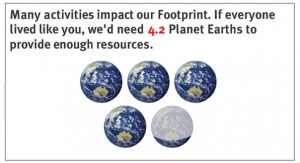 I know I am far from the first person to ask this, but can we really save the world – and by that I mean from the ravages of climate disruption – by changing our personal lifestyles? Or is that a story we’ve been fed by the powers that be in order to shift the burden of responsibility away from those who benefit most from our current economic system?
I know I am far from the first person to ask this, but can we really save the world – and by that I mean from the ravages of climate disruption – by changing our personal lifestyles? Or is that a story we’ve been fed by the powers that be in order to shift the burden of responsibility away from those who benefit most from our current economic system?
Perhaps it’s a story we’ve created ourselves in order to feel somewhat empowered: We can make a difference in climate change and environmental destruction by doing small, everyday things like changing to LED lightbulbs or taking the bus instead of driving. In any case, I am questioning this story. Part of Zen practice is noticing one’s views and recognizing them for what they are: views. That is, not necessarily completely true. In any case not the same thing as reality.
My dubious status as a Zen priest or “teacher” certainly doesn’t equip me to wrestle with this issue any better than other people, so I’m not blogging about it to teach you something. At the same time, I’ve promised to chronicle my efforts to (help) save the world – something I am doing because the bodhisattva vow requires it. Part of this is a careful and critical evaluation of the choices I make in my life in order to see where I am directly or indirectly causing harm.
I realize that all my life I’ve been carrying an immense sense of guilt associated with this story: My lifestyle choices – which at this point include owning a car, eating meat on occasion, flying home to see family at Christmas, using a smart phone and a computer – are directly contributing to the shrinkage of the arctic ice that is leaving polar bears stranded, and to the crazy weather that is making life even harder for those living in poverty. To sum it up: There’s blood on my hands, and all because I want to be happy and comfortable.
Of course, my lifestyle is directly contributing to the shrinking of the arctic ice, among many other things. But is radically changing my lifestyle going to make any difference at all?
Here’s the thing. I’ve been procrastinating consideration of the relationship between my lifestyle choices and climate change because the whole thing seemed so depressing and daunting. But yesterday I finally did it.
What I found is that my current modest life has an “ecological footprint” (a measure that includes one’s “carbon footprint” but also considerations like water usage) of around 4. This means that if everyone on the planet lived like I did, it would take 4 planet earths to support us. (While every measure of one’s ecological footprint has its limitations, I tried a couple different ones and got a similar result.)
You’ve got to be kidding me! My husband and I live in an 800 square foot apartment in a multistory building in the inner city. He walks to work and I drive a fairly fuel-efficient car about 120 miles a week. We have cheap, used furniture and only shop for clothes when our current ones might make us social outcasts. We recycle everything we can and buy organic and sustainable whenever there’s an option at our local Safeway. I fly home once a year, about 3000 miles round trip, to visit family.
If my lifestyle has an ecological footprint 4 times what would be sustainable worldwide (that is, it would only take one planet – the only planet we have – to support us all), what about all the people I see who live so much more extravagantly than I do?
Okay, I can only be responsible for myself. So I took the ecological footprint quiz again to see what the result would be if I made every change in my lifestyle I possibly could. Here’s what I would have to do in order to decrease my footprint by half (noting this still results in a lifestyle that, if lived by everyone, would require TWO planets to support, and I would have to do all of them):
- Whenever I bought clothing or paper products, I would almost always select items labeled as recycled, natural, organic, or made of alternative fibers (instead of my current sometimes);
- I would use everything until I genuinely needed to replace it (instead of using some items for years, but replacing others before I need to);
- I would add all the water and energy savings features to my home that I could (considering I own a condo) including replacing my toilet with a low flow one, installing low flow shower heads and faucets, adding extra insulation, and replacing my appliances with energy efficient ones;
- I would spend $255 a year on a carbon offset program;
- I would get a 50 square foot garden plot (in some communal area away from where I live, where it’s not an option) and grow some of my own food;
- I would obtain most of my food from natural foods markets (as opposed to some of it) and select foods that are certified organic or sustainably produced most of the time (as opposed to some of the time);
- I would be vegetarian, including dairy or eggs in my diet only a couple times a week and doing entirely without fish or meat;
- I would take the bus instead of driving a car to work, for a total of about 6000 miles a year (increasing the time I spend commuting each week from 3 hours to 8 hours, not to mention adding the risk of hanging around bus stops late at night);
- I would take the train to visit family in another state instead of an airplane (a flight from Portland to Minneapolis is 3.5 hours one way, while Amtrak takes 40 hours to cover the same distance, including two nights spent sleeping on the train).
Many of these changes require an attitude of self-sacrifice and renunciation I can’t see people adopting in the numbers necessary to slow down climate change. Wearing the same shabby shoes for years until there’s literally a hole in the bottom may make me feel virtuous, but does that have any impact whatsoever in a country where a significant proportion of the population just went out the day after Thanksgiving to spend millions on things they didn’t actually need?
Even more importantly, with the exception of using things until they’re worn out and being vegetarian, every one of the changes that would decrease my ecological footprint require considerable time, money, or both.
I think most of you reading this post will agree that the vast majority of Americans do not have much time or money to spare. Our earning power has decreased while the cost of living has increased. We need to work 40-60 hours a week to make ends meet, and that time doesn’t include commuting, gardening, and making all of our meals from scratch. Besides, even at my current level of income, many of the steps listed above I simply cannot afford.
Doesn’t it seem suspicious that this story about the importance of lifestyle change will keep the most conscientious among us busy toiling away in our gardens, working extra hours to pay and shop for local, organic, sustainable products, and waiting at bus stops? We may happily choose to do any of these things, and we may even firmly believe that they actually improve our standard of living – but is the issue at hand how satisfied we are with our lifestyles? Or is it about the survival of the planet?
If the most conscientious among us weren’t convinced that our green lifestyle was going make enough of a difference, maybe we’d be more insistent that our governments and corporations take action to address climate change. The vast majority of the millions (or billions) of us living as if there were 4 or 10 or 20 planets available to sustain us are not going radically alter our lifestyles until we hit a crisis or until we come together to legislate change.
This isn’t to say there’s no value in trying to minimize one’s ecological footprint. We are still responsible for our choices. However, I’m concerned that we’re so stuck in the myth of the power of the individual, we will fail to recognize collective responsibility.
Image from the Ecological Footprint Calculator at the Global Footprint Network












